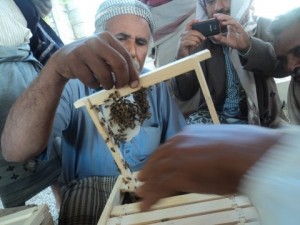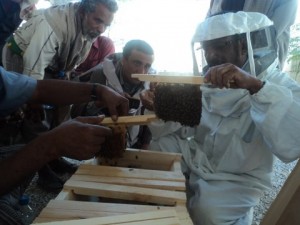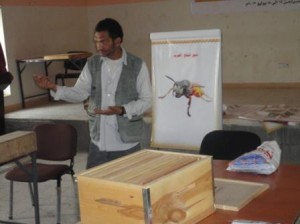[vc_row][vc_column width=”1/1″][vc_column_text]
Beekeeping project is sweet support to honey sector
By Jillian Slutzker
[/vc_column_text][/vc_column][/vc_row][vc_row][vc_column width=”2/3″][vc_column_text]In Yemen, honey is a dietary staple, sweetening dishes from breakfast to dessert and is used medicinally to treat ailments from digestive problems to respiratory infections. Yet beyond these benefits, Yemen’s sought-after honey and the beekeepers behind it have great economy-boosting power.
Recognizing the strong local and regional market for Yemeni honey and the potential economic benefits to rural honey-producing communities from an improved honey value chain, Creative Associates International, with support from the U.S. Agency for International Development, led a two-and-a-half year project to provide updated skills and resources to support beekeepers. The project assisted beekeepers with best practices in honey production to support in accessing competitive markets.
This initiative is part of Creative’s Community Livelihoods Project, which also worked to strengthen the value chains in two of Yemen’s other key agricultural sectors – coffee and horticulture. Through its trainings and activities, the beekeeping project affected more than 100,000 families affiliated with Yemen’s beekeeping and honey production sector.
 Yemen’s special Sidr honey is highly priced and in-demand, selling at prices as high as $310 per kilogram from vendors in Dubai. However, the Yemeni beekeepers do not typically receive their share of the economic benefits from this markup, says as Dr. Mohammad Ilyas, Director of Agriculture for the Community Livelihoods Project explains.
Yemen’s special Sidr honey is highly priced and in-demand, selling at prices as high as $310 per kilogram from vendors in Dubai. However, the Yemeni beekeepers do not typically receive their share of the economic benefits from this markup, says as Dr. Mohammad Ilyas, Director of Agriculture for the Community Livelihoods Project explains.
Unfortunately, after Sidr honey is exported to other countries, it is often diluted with other less valuable honey and resold.
“This lowers the quality and the trust of the international community,” says Ilyas.
Working with the Ministry of Agriculture and Irrigation, the beekeeping project helped an existing animal health laboratory develop a testing system to determine if honey is free from antibiotics. Before this testing, Yemen had no means of testing honey exports to international markets where buyers demand certified products that are free of chemicals and pesticides.
The project also distributed modern honey equipment, such as pollen traps, honey extractors and glass storage bottles, to beekeepers and honey producers around Yemen, enabling them to improve the packaging and presentation of their products to better compete in international markets.
Beekeeping is a longstanding vocation in Yemen, particularly in regions like Hadhramaut, home to the famous Sidr trees that produces the nectar bees use to create the popular Sidr honey. Traditional Yemeni beekeepers in Hadhramaut and other regions use nomadic beekeeping methods, Ilyas explains.
“Mostly the beekeepers are mobile and take the beehives wherever the food is available,” says Ilyas.
With an eye to preserving tradition, the beekeeping project introduced new knowledge about honey production and quality-control that Yemeni beekeepers could easily incorporate into their time-honored trade. The project targeted regions with the most active beekeeping communities.
In an intensive three-week workshop in Amman, Jordan, the beekeeping project prepared 28 Yemeni beekeepers as master trainers, who went on to train 2,400 fellow beekeepers around their country with support from the Community Livelihoods Project.
The master trainers studied best practices in a wide range of topics including honey bee disease diagnoses and control, beehive inspection, techniques for rearing queen bees and the economics of beekeeping and honey processing.
 Back in Yemen, the Community Livelihoods Project beekeeping initiative separately trained 81 Yemeni beekeepers on food safety procedures, quality standards and certifications, making their product more competitive for international markets.
Back in Yemen, the Community Livelihoods Project beekeeping initiative separately trained 81 Yemeni beekeepers on food safety procedures, quality standards and certifications, making their product more competitive for international markets.
Although the trainings provided new skills, technologies and ideas to improve their trade, Yemeni beekeepers spread around the country lacked a means to organize and regulate their industry on a national level. Additionally, beekeepers had no forum to communicate and coordinate collectively with honey wholesalers and retailers.
“There are so many regional beekeeping and honey associations but there was no central association that could represent this beekeeping industry here in Yemen,” says Ilyas.
This year, the newly established Federation of Yemeni Beekeepers officially launched with support from the Community Livelihoods Project and the Ministry of Agriculture and Irrigation. The federation brings together individuals, organizations and businesses from all areas of the beekeeping sector to improve the industry within Yemen and make Yemeni honey a more competitive export.
Speaking at the inaugural ceremony of the Federation, on June 17, Dr. Abdullah Nasher, the newly elected head of the Federation, presented a four-year strategic plan describing the economic benefits of the plan and the importance of ongoing cooperation among stakeholders, which the new organization would facilitate.
“Implementing the strategy will raise honey production in Yemen by 25 percent; however, this will need the assistance and cooperation of the government and donors,” said Nasher.
 Also speaking at the launch event, Deputy Minister of Agriculture and Irrigation, Dr. Mohammad Al-Ghashm, welcomed the Federation and the critical role it would play in coordinating efforts across the beekeeping and honey-producing sector. Al-Ghashm announced the cancellation of all future charcoal exportation permits, which have led to massive logging projects that have damaged trees that are nutritional sources to honey-producing bees.
Also speaking at the launch event, Deputy Minister of Agriculture and Irrigation, Dr. Mohammad Al-Ghashm, welcomed the Federation and the critical role it would play in coordinating efforts across the beekeeping and honey-producing sector. Al-Ghashm announced the cancellation of all future charcoal exportation permits, which have led to massive logging projects that have damaged trees that are nutritional sources to honey-producing bees.
With the economy-boosting innovations of Community Livelihood Project’s beekeeping initiative, Yemen’s beekeeping sector is on the road to long-term growth and a competitive edge in international markets. Meanwhile, in Yemen where local beekeeping communities are thriving, Yemenis will continue to enjoy their treasured, and now more profitable, honey.
Yemenis “consider honey as the solution to many of the health issues,” says Ilyas. “I have seen most of the Yemenis use honey in breakfast. I have seen them use this in traditional restaurants. Whatever the sweet dish is prepared, it is prepared with honey.”[/vc_column_text][/vc_column][vc_column width=”1/12″][/vc_column][vc_column width=”1/4″][vc_widget_sidebar sidebar_id=”sidebar-primary”][/vc_column][/vc_row]